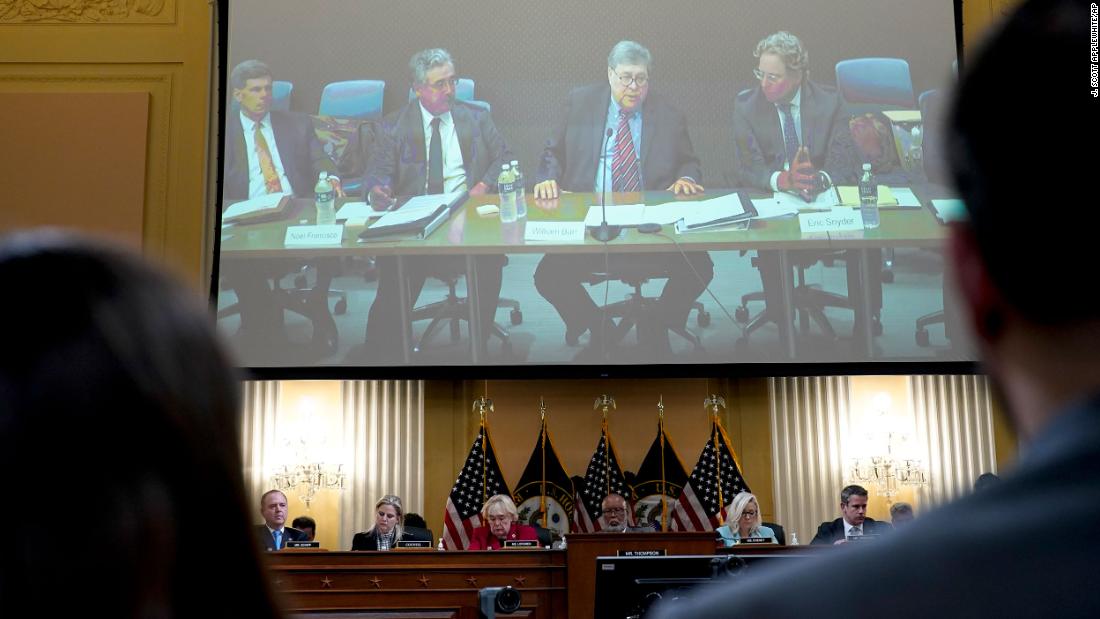Testimony to the House select committee investigating the January 6, 2021, attack on the US Capitol has revealed that it wasn’t only journalists, elections officials and Democrats who were rejecting Trump’s lies about what happened in the election he lost but claimed to win. People Trump selected for important positions, from his campaign manager to the US attorney general, were also saying — mostly in private — that Trump’s fraud allegations were baseless.
The January 6 hearings are ongoing, and the public has only seen committee-selected video clips of certain former officials’ testimony. We know that some other figures in Trump’s orbit were joining him in promoting lies about the election, not rejecting those lies.
But the hearings have already shown that Trump’s government appointees or people on his campaign dismissed at least 10 of his false claims — from the overarching lie that the election was stolen to various specific tales about what happened in swing states he lost.
Here’s a list.
1) The false claim of a ‘stolen’ election
Trump has incessantly repeated the false claim that the election was stolen from him — baselessly insisting that he would have been returned to the White House if not for massive fraud and other nefarious Democratic behavior.
Richard Donoghue, who served as principal associate deputy attorney general and then as acting deputy attorney general, also testified that claims of major fraud were untrue — and that he told Trump directly: “I said something to the effect of, ‘Sir, we’ve done dozens of investigations, hundreds of interviews. The major allegations are not supported by the evidence developed. We’ve looked at Georgia, Pennsylvania, Michigan, Nevada. We’re doing our job. Much of the info you’re getting is false.'”
Derek Lyons, who was White House staff secretary and counselor to Trump, testified that, at a meeting about a month and a half after Election Day, top White House lawyers Pat Cipollone and Eric Herschmann “told the group, the President included, that, you know, none of those allegations had been substantiated to the point where they could be the basis for any litigation challenge to the election.”
Alex Cannon, who was a lawyer for the Trump campaign, testified that he told Vice President Mike Pence at the White House in November 2020 that he had not found “anything sufficient to alter the results of the election” and that he had told White House chief of staff Mark Meadows on a November 2020 call that “we weren’t finding anything that would be sufficient to change the results in any of the key states.”
Matt Morgan, who was the Trump campaign’s general counsel, testified that, as of early January 2021, he and top Pence advisers — chief of staff Marc Short and attorney Greg Jacob — were in agreement that even “if aggregated and read most favorably to the campaign,” election “fraud, maladministration, abuse or irregularities” were “not sufficient to be outcome-determinative.”
2) The false claim that Trump had won on Election Night
But it was clear to other key figures in Trump’s orbit — as it was to millions of others — that his leads in the early Election Night count, as millions of votes remained uncounted, did not mean he had won. Bill Stepien, who was Trump’s campaign manager, testified that Election Night was “too early to call the race”: “It was far too early to be making any calls like that. Ballots — ballots were still being counted. Ballots were still going to be counted for days.”
Stepien said he had explained to Trump that early returns would be “positive,” but they would then have a long night waiting for the counting of additional ballots. The fact that states’ vote counts got worse for Trump as the hours went by, Barr said, was not indicative of fraud: Barr noted that “people had been talking for weeks, and everyone understood for weeks, that that was going to be what happened on Election Night.”
Miller testified that he recalled saying on Election Night “that we should not go and declare victory until we had a better sense of the numbers.” Ivanka Trump, Trump’s daughter and senior adviser, testified that she didn’t know if she had held a “firm view” about what Trump should say on Election Night, but she added, “The results were still being counted. It was becoming clear that the race would not be called on Election Night.”
3) A false claim about fraudulent totals in Philadelphia
4) A false claim about absentee ballots in Pennsylvania
Barr explained in his testimony that Mastriano had been comparing apples to oranges. “Once you actually go and look and compare apples to apples, there’s no discrepancy at all,” he said.
5) A false claim about a truckload of ballots being driven from New York to Pennsylvania
Donoghue testified that he told Trump: “I essentially said, ‘Look, we looked at that allegation. We looked at both ends, both the people who load the truck and the people unload the truck. And that allegation was not supported by the evidence.”
6) False claims about Dominion voting technology
Barr testified: “I saw absolutely zero basis for the allegations, but they were made in such a sensational way that they obviously were influencing a lot of people, members of the public, that there was this systemic corruption in the system and that their votes didn’t count and that these machines controlled by somebody else were actually determining it, which was complete nonsense. And it was being laid out there. And I told them that it was — that it was crazy stuff and they were wasting their time on that. And it was doing a great, grave disservice to the country.”
Barr added of Trump and Dominion: “And I was somewhat demoralized because I thought, boy, if he really believes this stuff he has, you know, lost contact with — with — he’s become detached from reality if he really believes this stuff.” Barr also said of Trump: “There was never an indication of interest in what the actual facts were.”
7) A false claim about Dominion machines in Michigan
Donoghue, too, rejected the “68% error rate” claim. He testified of a conversation with Trump: “And then I went into, for instance, this thing from Michigan, this report about ‘68% error rate.’ Reality is it was only 0.0063% error rate, less than 1 in 15,000. So the President accepted that. He said, ‘OK, fine, but what about the others?'”
8) A false claim about non-citizens voting in Arizona
Stepien testified that the claim that “thousands of illegal citizens, people not eligible to vote” had cast Arizona ballots was a “wild claim” that “on its face didn’t seem, you know, realistic or possible to me.” He said that after asking Cannon to look into the claim, it turned out “the reality of that was not illegal citizens voting in the election” but rather that the votes were cast by “people who were eligible to vote.”
9) The false story about election workers in Georgia
Donoghue testified that he debunked the claim at length to Trump: “The President kept fixating on this suitcase that supposedly had fraudulent ballots and that the suitcase was rolled out from under the table. And I said, ‘No sir, there is no suitcase.’ You can watch that video over and over. There is no suitcase. There is a wheeled bin where they carry the ballots, and that’s just how they move ballots around that facility. There’s nothing suspicious about that at all. I told him that there was no multiple scanning of the ballots — one of the — one part of that allegation was that they were taking one ballot and scanning it through three or four or five times to rack up votes, presumably for Vice President Biden. I told him that the video did not support that.”
Byung “BJay” Pak, a Trump-appointed former US attorney in Georgia who was previously a Republican state legislator, testified that the supposed “suitcase” was actually an “official lockbox” for storing ballots at that facility and that the full video disproved the fraud claims Giuliani had tried to promote by showing Georgia legislators a limited section of the footage. Pak, who resigned in January 2021, testified: “We interviewed — the FBI interviewed — the individuals that are depicted in the videos, that purportedly were double, triple counting of the ballots, and determined that nothing irregular happened in the counting, and the allegations made by Mr. Giuliani were false.”








More News
Opinion | Trump Didn’t Really Do That Well in Pennsylvania
The Next Winner of the World Chess Championship Could Be the Youngest Ever
McKinsey Is Under Criminal Investigation for Its Opioid Work